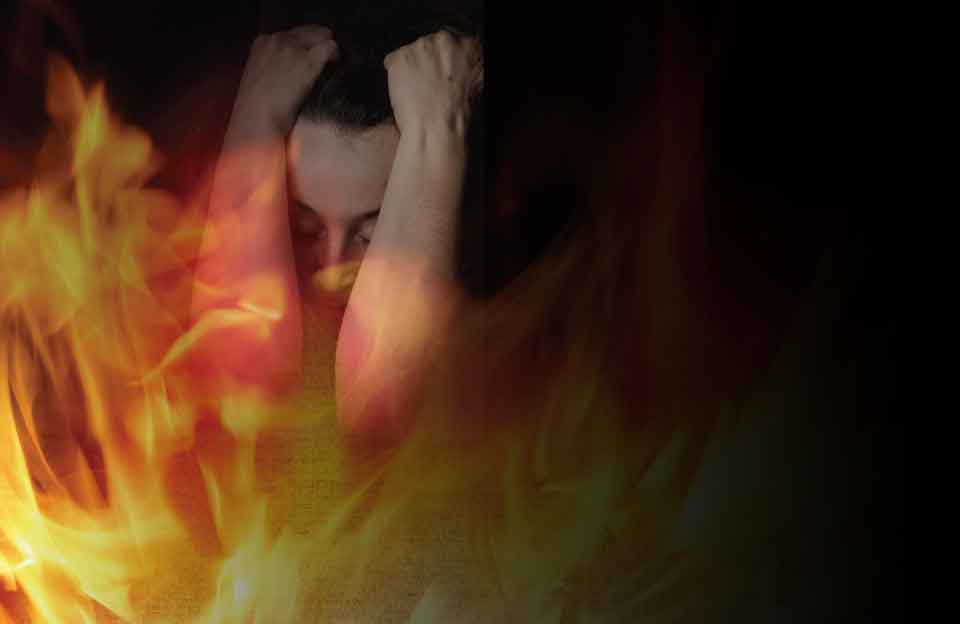Burn

A girl executes her escape plan, with one unexpected twist at the end.
She walks through the house. It’s quiet now; everyone’s sleeping. Behind the bedroom door she can hear her father’s deep, relaxed breathing: hiss when he inhales, snort when he exhales. She stands waiting, waiting to hear if maybe this next time he doesn’t exhale. But he does, he always does. The bed creaks as he rolls over. Or maybe it’s her mother, turning away from him. The way she’s always turning away from him.
Her heart beats faster. She tries to take deep breaths, from all the way down in the pit of her stomach, so she can watch it happen. Then breathe out slowly, without a sound. She mustn’t be scared. She can be scared later.
She mustn’t be scared. She can be scared later.
She closes her eyes for a moment before moving on. A floorboard creaks. She stops, listens. Did they hear her? But the only sound in the house is people sleeping. Their breathing, the bed creaking. If you didn’t know better you’d think this was one of those houses where everyone slept through the night, peaceful and calm.
Down the stairs and into the living room, with the remains of last night’s party still scattered on the tables. Empty beer cans and liquor bottles, half-empty bowls of stale chips, and overflowing ashtrays that give the living room a sour, ashy smell. On the dining table there are several half-full glasses of what’s probably rum and Coke. She takes one and gulps it down. The sweet, lukewarm liquid burns her throat; she coughs as quietly as she can, holding her hand over her mouth.
There’s a creak from the leather sofa, and she turns. One of the men from the party is lying there. She doesn’t recognize him, but now and then they all look the same.
She walks up to him. His shirt’s come untucked and the soft flesh of his belly spills over the waistline of his pants. There’s a strip of black hair running down under his belt. She feels queasy. The aftertaste of rum and Coke fills her mouth. And something sour. He grunts a little in his sleep, smacks his lips contentedly, and turns partway round on the sofa as if she didn’t exist. From the coffee table she takes an empty bottle, the one with a pirate captain on its label, and lifts it over his head. Stands with both arms raised ready to bring it down with full force if he wakes up. He makes a little whimper, a sigh, and she can see his eyes darting back and forth under his eyelids. But he doesn’t wake up. Just settling back down.
She returns the bottle to its place . . . quiet, quiet. She tries not to make any sound at all as she passes from the living room to the kitchen. She moves as quickly and purposefully as she can but at the same time painstakingly slow, not wanting to make any noise. In her mind, night after night, she has rehearsed her movements through this house.
The door between the kitchen and garage sticks; it hasn’t been used in so long. She’s at the point of giving up when it finally gives way with a jerk. She loses her balance and has to reach out behind her. The garbage bag that always hangs on the door falls off and spills its contents on the kitchen floor, which was already dirty. She stands there in an awkward posture holding her breath, listening, but she doesn’t hear anything from the living room or upstairs. Then she kicks the bag aside, straightens up, and steps over the garbage and out into the garage.
It’s been a long time since a car was parked here. The space is crammed with junk, old moving boxes her father keeps with odds and ends he thinks he’ll need someday: canned goods, mildewed books, a broken record player. An old sofa and some chairs with torn seats and broken back rests are piled up, a mountain of castoff furniture. In the corner an old rabbit cage, with moldy hay left in the bottom, but no bunny.
The rabbit died within a week of her getting it. Someone had forgotten to lock the gate at night. Her mother had been furious. The rabbit had hopped out and gnawed on a loose wire during the night. The fuse blew but no one noticed it until the next morning, when they discovered the empty cage and Ninus fried to a crisp in the living room. She never got a new bunny, even though her father often promised her one at bedtime. But she knew her mother wasn’t going to have another pet in the house, no matter how much she begged. If she wasn’t capable of looking after them properly, then pets were out of the question, her mother said. And so the cage got thrown in the garage.
She turns on the fluorescent lights. They flicker to life, first one end of the strip, then the other. She tries to get her bearings. Find what she needs. The old grill. She bites her lip and fights back tears at the thought that maybe the bottle of lighter fluid won’t be under the lid as she’d remembered it. What will she do then?
She can’t find the grill—it must be hidden under all this crap. Or else her father has thrown it out. She gasps at the thought but pushes it aside. No, her father doesn’t throw anything away. It has to be here somewhere. She just has to search for it. She starts moving things around, systematically. Time moves so fast. What if she can’t find it before they wake up?
For a second, everything blurs and she can’t tell moving boxes from sofas, or books from a stack of old VHS tapes.
She focuses on the makeshift shelves, where paint cans are placed next to rusted tools without any rhyme or reason. As if they’d just been tossed there long ago, back when the house was first built, and no one’s given them a second thought. She looks behind green milk crates and old computers. It smells like her grandmother’s summer cottage always did, every year when she stayed there for two weeks without her parents. The musty, closed-window smell makes her happy for a brief moment. It will be all right. It will all work out.
In the corner, someone’s tossed a few moving boxes. They look sad and empty. But behind them she glimpses the three metal legs of what can only be the grill. She snatches up the boxes, but they tear apart in her hands. Big pieces of soggy, mildewed cardboard. But, yes, that’s the grill all right. Black, rusty, and covered in dust. She lifts the lid carefully, afraid she’ll find nothing underneath. That she’s remembered it wrong. But sure enough it’s there: on the grate beside a bag of charcoal is the black plastic bottle of lighter fluid.
She weighs it in her hand. There’s not as much as she’d counted on. Is it enough? Will it give them a good scare so she can slip out in the confusion? Or will it just sputter and do nothing?
She forces the thoughts aside; she just has to follow through with her plan. Her pulse slows, and she can feel each heartbeat like a hand gently tapping her on the chest. Easy now, it says, easy now. You’re on your way out of here.
She knows exactly what to do now. She’s thought this through a million times. She sidesteps the junk on the floor, nearly knocks over a pile of newspapers, but catches them just in time. Back in the kitchen, she takes pains to close the door behind her softly. Then through the living room and up to the front door. She opens it and has a quick look around.
She’s thought this through a million times.
No sign of life. Her neighbors are sleeping in, just another quiet Sunday morning. She leaves the door ajar and heads back into the living room.
She’s thought it through. The curtains, the ones that are always drawn in front of the sliding doors out to the unused terrace, those would work best. They’re made of some artificial material that rustles whenever you touch them. This, she thinks, is where she can get things going the fastest.
She tiptoes, quiet as can be.
Stands in front of the see-through curtains and looks out at the overgrown yard. She closes her eyes and sees what the yard could look like: green, neatly mowed, and splashed with sunlight. Then she opens them again, knowing it could never be like that for her. Not here. Not now. But maybe someday. Some other place. When she’s no longer afraid.
A deep breath, then she unscrews the cap and splashes the curtains with the noxious fluid. Some of it lands on the carpet, which immediately soaks it up and spreads a dark stain under her feet. She jumps away. Turns, looks for something to dry the bottoms of her shoes with. Ends up just kicking them off.
She takes out the lighter she’s been hiding in her pocket ever since last night. No one saw her take it; for a split second she wasn’t being watched by her father or the others. For a long while last night, she lay staring at it. On one side, in red letters, it says “Marlboro Country.” The other side has the name “Carl” engraved on it. She can’t remember which of them is Carl. They all look the same. She doesn’t like to look at them. So she always closes her eyes. They think it’s because she enjoys it.
Maybe he’s the one on the sofa. Carl. She tastes the name, and again feels the urge to smash the bottle over his head. He’ll be happy to know she’s found his lighter, she thinks to herself and smirks just before flipping the cover back and rolling her thumb down the little metal wheel. It’s like lighting a cigarette: first a click, then the smell of lighter fluid. She stands for a moment staring into the blue and yellow flame, then carefully touches it to the bottom corner of the curtain.
Flames race up the curtain, become part of its brown and orange pattern.
The fire starts immediately. Flames race up the curtain, become part of its brown and orange pattern. She stares at it, fascinated. It happens faster than she’d expected: the curtains vanish before her eyes, and the pile of newspapers on the floor beside the windows catch fire. She needs to leave now, follow her plan. Don’t stand here staring. But she’s mesmerized by the greedy flames. How they tear through everything. Her stomach shakes with laughter. She has to put her hand over her mouth to keep from giggling. Look what it can do. The curtains are gone now, eaten up, the carpet’s on fire, and the wrinkled wallpaper, too. She’d like to stay here and watch everything around her get eaten away. But she has to go. It’s hot, she can feel it on her cheeks. The smoke burns her throat and stings her eyes, which have started watering up, all on their own. She’s not going to cry now. She’d rather laugh.
She turns around. Something is off, but she’s not sure what. It’s a familiar feeling. Disorienting. She shakes it off. Walks fast through the living room in her stocking feet. She can feel the heat through her threadbare cotton socks. In the entryway she slips her feet into a pair of her mother’s clogs. They’re too big for her.
The bathroom door opens and smacks her on the arm; she stumbles forward in surprise.
She turns around and looks up at the man from the sofa. Carl? He looks her straight in the eyes, as if he doesn’t quite understand what’s happening.
“Hi,” he says, his voice hoarse, and she can see that he’s missing a tooth. One of the molars behind his eyetooth. He clears his throat, as if he recognizes her. That sour taste in the mouth. She pushes it down, swallows, and tries her best to smile at him, quickly, as she’s done before. So he looks at her mouth and not into her eyes. She hates it when they try to look into her. As if they shared some special bond.
The man is just about to say something more. But, quick as lightning, she puts her palms on his chest and pushes with all her might. He’s still a little drunk and stumbles backward, hits the toilet, and lands on the rim with the seat up behind him. Then she slams the door shut.
The fire is roaring in the living room now, louder than you’d think, and smoke has spread to the entryway. It slithers, grayish black, along the ceiling and makes her throat itch.
She coughs and at the same time pushes against the door with all her strength. Looks around for something to block the door with, but can only find the bureau in the entryway. But she can’t move that, it’s too heavy. It’s her grandmother’s old bureau, and it took two men to carry it in after she died.
She counts to ten, hearing him curse away in there, then lets go and dashes to the front door.
She tumbles outside, but he’s already making his way from the bathroom. “What are you up to?” he rasps at her. The oversized clogs nearly trip her as she goes down the three front steps. All she wants is to keep running, across the street and out into the woods behind the houses, down to the lake and roadway. Hop a ride. Just the way she’d planned it. So she’d be gone when the fire department shows up, and her mother and father come out onto the street with their hair sticking up, still in their pajamas, nothing they can do but stand there and watch as their house burns down. But instead she turns back, grabs the key from her pocket, bounds up the three worn concrete steps, and locks the door from outside, just as the latch is being pressed down. Carl was not part of the plan.
Afterward she turns and looks down the street to check if anyone has seen her. Then she runs, as fast as she can, toward an opening in the woods.
Translation from the Danish











